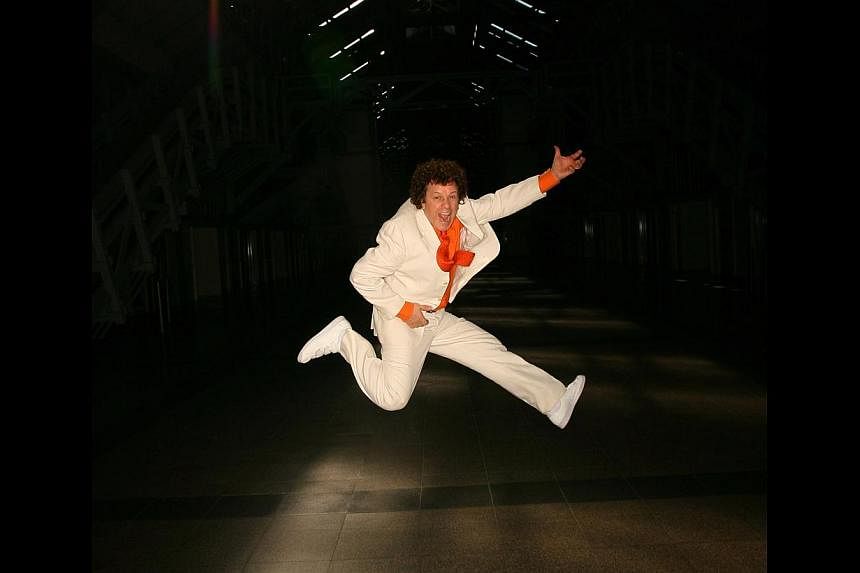Leo Sayer's disco and soft-rock songs such as More Than I Can Say, When I Need You and You Make Me Feel Like Dancing were huge hits in the 1970s and 1980s, but mention his name these days and people might go: "Leo who?"
It is something British singer Sayer has come to terms with as Life! finds out in a telephone interview ahead of his gig here at the Esplanade Concert Hall on Jan 17.
"People ask 'Who is Leo Sayer?' And then they hear the songs and they go 'Oh, that guy'," he says, speaking from Sydney, where he now lives.
"Even back in England, my own country, and America, where I worked for many years, there are still people who don't put Leo Sayer and You Make Me Feel Like Dancing together. But gradually, as I go around the world, more people are realising that I'm the singer."
Sayer, 66, found success early in his career. While his debut single in 1973 did not chart, the follow-up in the same year, The Show Must Go On, went to No. 2.
While his subsequent singles all made the Top 10 in the United States, his major breakthrough came when later singles You Make Me Feel Like Dancing (1976) and When I Need You (1977) both went to No. 1 in the US. The former tune also won a Grammy Award for Best R&B Song in 1978.
He continued to find success in the 1980s with songs such as his cover of More Than I Can Say (1980) and Have You Ever Been In Love (1982).
While his 1990s output was modest, British DJ Meck's remix of a song he recorded in 1977, Thunder In My Heart, went to No. 1 in the British charts in 2006.
Not one to rest on his laurels, Sayer is still creating new material and is expected to release his latest album, Restless Years, next month.
The singer and songwriter, who is in a long-term relationship with his partner and manager, Donatella Piccinetti, is looking forward to performing in Singapore again, and he still keeps the ticket stub from his last gig here in 1982.
Fans who turn up for the upcoming concert can look forward to a "really strong show", he promises.
"We have a fantastic band from Britain and these guys reproduce the songs faithfully and are great musicians and soloists as well. It will be a dynamic performance. We really rock and we can make you really dance. It's an exciting show, I'm 66 now, but I'm still dancing all over the show."
1 Where was the most unusual place you heard your music being played?
I didn't go there myself, but a friend of mine found me in a bar in Kathmandu. The bar was called Leo's Bar and it was full of pictures of Leo Sayer. And all the Nepalese guy did, all the time, was play back-to-back Leo Sayer records. I don't know if the bar is still there, but that's where I dream to go.
I thought that was pretty outrageous, but apparently I'm very popular in Asia. I know because I had a tailor making my suits in Thailand and, as soon as I walked into the store, he said "Oh my God, the great Leo Sayer." That's when you know your music travels.
2 In the 1970s, you were one of the most prominent pop artists. What do you remember best from those days?
I remember that we were such great friends, there was an incredible range of talent, people such as Roy Wood with Wizzard and the guys from Slade. Then there was Kool And The Gang in America and Alvin Stardust in England and everybody had such clever, great records.
It was very exciting. I had great friends in America when I lived there, with Boz Scaggs and the guys from Toto, and they made terrific records.
3 What are your thoughts on the state of pop music today?
Back then, there wasn't this feeling that we had to copy each other's records.
I think that goes on a lot now. To me, Lady Gaga and Justin Bieber, they seem to copy the same records, they copy each other a little bit. I don't feel that there is much originality unlike in our day.
4 In 1983, you had a song called Orchard Road. Was it inspired by the shopping street in Singapore?
It was about a street in London. The funny thing is, the little street was called Churchfield Road and it didn't sing very well.
I had just been performing in Singapore in 1982 or 1983 - that was the last time I was there. So I'd come back from Singapore and I had Orchard Road in my mind. To a certain extent, and I've said this before, it's got a lot of Singapore in it.
I must have had some good shopping, brought back lots of things. I had a lot of great Singaporean experiences, maybe even a massage.
5 So do you plan to go back to Orchard Road when you come for your show?
When I came back for the Grand Prix recently, I found it a bit over- commercialised and I think there are better places to shop. What's great now is that the street markets have become stronger, so you go to the night markets.
6 What are you writing about these days? What inspired the songs in your upcoming album?
I'm looking at the songs, at the world, the environment, and climate and all these things we all think about. Of course, there are love songs, but I think the new songs have a much more social conscience, which is important these days.
It's strange because my songs are personal, but they become universal. I'm writing about an experience that's very often very close to my heart, or close to my own experience, my story. And the funny thing is, people will take it on and make it their story as well, which is very humbling.
7 You recently did a song and music video with other Australian artists to protest against fracking, the process of extracting gas and oil from shale rock. How did that come about?
Australia is a beautiful country and there are a lot of greedy people out there who think every resource we have is there for the taking. It's important for people to stand up and say no.
We can be doing more with windmills and solar panels, but there are greedy people who don't want that to happen. They prevent people who disagree with them from having a strong voice. If I can add my voice, I am happy to do that. We are learning that we have to look after this planet.
8 How would you like to be remembered?
I'd like my songs to be remembered. I'm not so worried about myself. As people enjoy the songs, they get something from them. Maybe there's a message in there for them - that would make me so happy.
I don't really think of myself so much. Some people do, but I'd just like to be remembered for the music.


